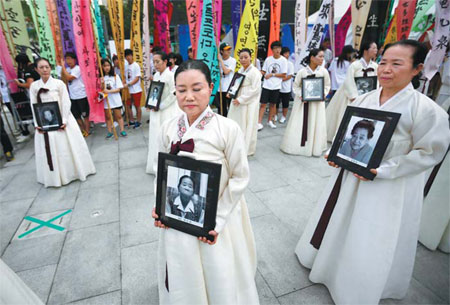US House links spending bill to 'comfort women'
The US House of Representatives has for the first time passed a $1 trillion spending bill to which a document is attached, calling for US Secretary of State John Kerry to encourage Japan to address the issue of "comfort women" - women forced to be sex slaves for the Japanese military during World War II, Xinhua News Agency reported on Thursday.
Although the bill is not legally binding, its approval has important symbolic meaning because it can exert pressure on Japan to change its historical perception, observers said.
A document attached to the bill for 2014 urges the secretary to encourage the implementation of Resolution 121, which was adopted by the chamber in July 2007.
The resolution calls for the Japanese government to "formally acknowledge, apologize and accept historical responsibility in a clear and unequivocal manner" for its coercion of more than 200,000 young women into sexual slavery during its colonial and wartime occupation of Asia and the Pacific Islands during World War II.
Meanwhile, the Republic of Korea plans to partner with China and several Southeast Asian countries to seek UN world documentary heritage status for comfort women, a ROK official said on Tuesday.
"We will file an application with the United Nations Education, Scientific and Cultural Organization to list 'comfort women' in the UNESCO Memory of the World Register," Kim Un-ji, a section head of the ROK Ministry of Gender Equality and Family, said in a news release.
Japan Chief Cabinet Secretary Yoshihide Suga showed his displeasure at the ROK proposal on Wednesday, Xinhua News Agency quoted Japanese reports as saying.
The conscription of women, including from China, the ROK and Southeast Asia, to act as prostitutes was a grave crime committed by the Japanese military, Chinese Foreign Ministry spokesman Hong Lei said at a news briefing on Thursday.
China, the ROK and other Asian countries have similar experiences and concerns regarding Japan's history.
"China would like to work with other victimized countries to maintain historical justice and to urge Japan to correct its understanding of history and reflect on its own history to gain trust from neighboring countries and the international community," Hong said.
Japan attempted to play down its aggressive history and downplay the comfort women issue and other war crimes committed during World War II, angering its neighbors including China and the ROK, and causing disappointment in its main ally, the United States.
On Dec 26, Japanese Prime Minister Shinzo Abe visited the Yasukuni shrine that honors Japan's war dead, including 14 Class-A war criminals.
The document attached to the spending bill shows that Japan's denial of responsibility for crimes committed during World War II has aroused deep concern in the US, said Lyu Yaodong, director of the Japanese diplomacy department of the Institute of Japan Studies under the Chinese Academy of Social Sciences.
"Japan's attitude toward the issue of comfort women and its history of aggression has alerted all of international society. The US wants to urge Japan to be more cautious of its words and actions through the passing of the document," Lyu said.
Although the document is nonbinding, it is of great symbolic meaning in urging Japan to face its crimes committed during World War II, said Jin Canrong, deputy dean of the School of International Studies at Renmin University of China.
"It will add public pressure on Japan. Japan deeply relies on US power to compete with China in the region, so the passing of the document no doubt worries Japan," Jin said.
"Many Japanese politicians have gone to the US lately to win understanding from the US government. That shows Japan has already felt great political pressure," he added.
Continuing efforts by China and the ROK to reveal Japan's crimes to the world also helped the US to realize the seriousness of the problem, Lyu added.
US Assistant Secretary of State Daniel Russel expressed regret at worsened China-Japan ties and Japan-ROK ties at a news briefing during his visit to Brussels on Tuesday.
The US calls on all parties to remain calm and exercise restraint, he said.
Contact the writers at zhouwa@chinadaily.com.cn
Xinhua contributed to this story.
|
Participants carry the portraits of Korean women who were forced to be sex slaves by the Japanese military during World War II at a requiem ceremony for former "comfort woman" Lee Yong-nyeo in central Seoul in August. Lee, who was one of the few surviving sex slaves, or comfort women, for wartime Japanese soldiers, died on Aug 11. Kim Hong-Ji / Reuters |
(China Daily 01/17/2014 page10)









